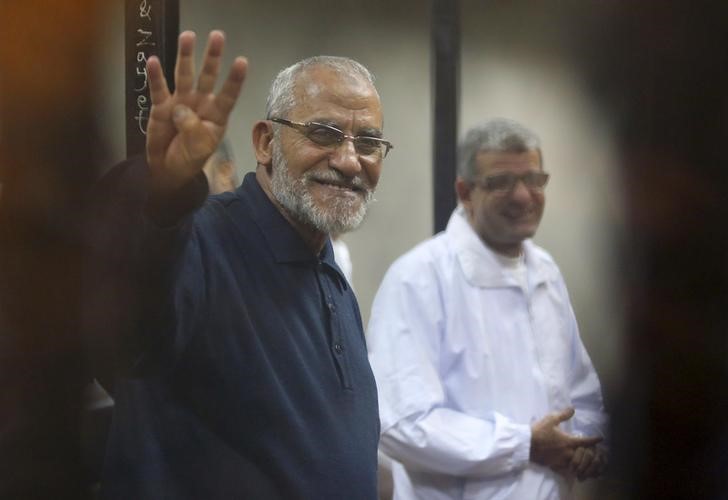CAIRO (Reuters) - An Egyptian court's decision to sentence 14 men to death and jail 37 others accused of ties to the outlawed Muslim Brotherhood was "politically motivated" and "blatantly unjust", Human Rights Watch (HRW) said on Sunday.
The court condemned Muslim Brotherhood leader Mohamed Badie and 13 other senior members of the group to death on Saturday. American-Egyptian Mohamed Soltan, the son of a Brotherhood preacher who received a death sentence at the same hearing, was among those sentenced to life in jail.
The men were among thousands of people detained after freely elected Islamist president Mohamed Mursi was toppled in 2013 by the military under Abdel Fattah al-Sisi, who is now president. Sisi describes the Brotherhood as a major security threat.
The White House has condemned the verdict against Soltan, who was found guilty of supporting the veteran Islamist movement and transmitting false news.
Saturday's case was known in local media as "The Rabaa Operations Room" trial in reference to a sit-in at Rabaa square in 2013 in which hundreds of people protesting at the overthrow of Islamist President Mohamed Mursi were killed when security forces tried to clear the area by force.
Cairo defended its actions, saying it had given protesters the opportunity to leave peacefully and that armed elements within the Brotherhood initiated the violence.
"It appears that the case against Muslim Brotherhood members leading to death sentences of 14 men is politically motivated," Sarah Leah Whitson, HRW's executive director for the Middle East and North Africa, calling it a "a sham proceeding".
"The fact that those who publicized the mass killings of 2013 could go to prison for life while those who did the killings receive official accolades perfectly symbolizes the abject failure of transitional justice in Egypt," she said.
The verdicts can be appealed in Egypt's highest civilian court.
Officials in Egypt's foreign ministry were not immediately available for comment.
An online campaign to free U.S-educated Soltan says he was not a member of the Brotherhood and that he had spoken to international media in 2013 because of his ability to converse in fluent English and Arabic.

HRW also criticized a recent U.S. decision to end a freeze on military aid to Cairo at the same time as the Egypt judiciary had been passing sentences against journalists and the political opposition.